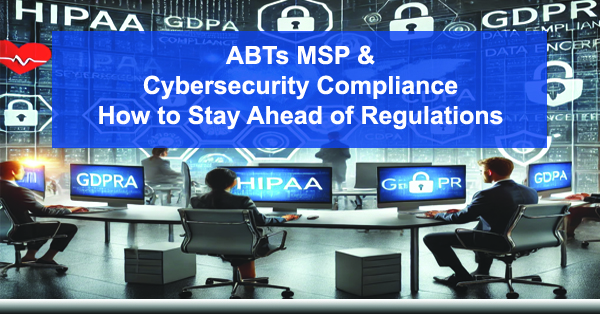
ABTs MSP and Cybersecurity Compliance | How to Stay Ahead of Regulations
It seems like every day now brings a new alert to another company, municipality, or government cyber breech. Businesses across all industries are facing increasing pressure to comply with stringent cybersecurity compliance regulations to protect customer and business data. From healthcare to finance, and legal to retail, maintaining compliance with data protection laws is not just a best practice—it’s a legal necessity. Failing to comply with these regulations can result in hefty fines, legal action, and significant damage to your reputation.
For businesses operating in highly regulated industries, staying compliant can be an overwhelming task. This is where Managed IT Services come into play. By partnering with a managed IT provider, businesses can ensure they meet the necessary cybersecurity compliance requirements while safeguarding sensitive data from threats.
We’re exploring the importance of cybersecurity compliance during Cybersecurity Month, looking at the common regulations you need to be aware of, and how ABT’s managed IT services help businesses maintain compliance and avoid costly repercussions.
What is The Importance of Cybersecurity Compliance?
Cybersecurity compliance is the process of adhering to laws and regulations that are designed to protect sensitive information. These regulations vary by industry and location, but they all share a common goal: ensuring that businesses implement adequate safeguards to protect data from breaches and unauthorized access.
Whether you’re managing patient records in the healthcare sector or handling sensitive financial information in a bank, compliance is non-negotiable. Businesses that fail to comply with these regulations not only risk facing severe financial penalties but also jeopardize the trust of their customers and partners.
In addition to the potential for fines and legal consequences, non-compliance can lead to data breaches that expose sensitive information. Such breaches can result in long-term damage to your brand’s reputation, loss of customers, and costly recovery efforts.
Common Cybersecurity Compliance Standards
While there are numerous regulations depending on the industry and location of your business, some of the most common data protection standards include:
1. GDPR (General Data Protection Regulation)
The GDPR is a European Union regulation designed to protect personal data of individuals within the EU. Even if your business is not based in Europe, you may still need to comply with GDPR if you handle data from EU citizens. The GDPR mandates that businesses implement strong data protection measures, including encryption and data minimization, and gives individuals more control over their personal information.
2. HIPAA (Health Insurance Portability and Accountability Act)
HIPAA applies to businesses in the healthcare industry and requires strict measures to protect patient data (Protected Health Information or PHI). Healthcare providers, insurers, and any business that handles medical data must ensure that all patient information is securely stored and transmitted. Failing to comply with HIPAA can result in significant fines and legal repercussions.
3. CCPA (California Consumer Privacy Act)
The CCPA focuses on the privacy rights of California residents and grants them control over how their personal data is collected, used, and shared. Businesses that handle data from California residents must comply with CCPA by providing clear notices of data collection, allowing individuals to opt-out of data sharing, and taking steps to secure personal data.
4. PCI DSS (Payment Card Industry Data Security Standard)
For businesses that process credit card transactions, PCI DSS compliance is mandatory. This standard outlines specific security requirements for protecting cardholder data, including encryption, monitoring, and network security controls. Non-compliance with PCI DSS can result in fines and increased liability in the event of a data breach.
5. SOX (Sarbanes-Oxley Act)
SOX is a U.S. law that focuses on corporate financial accountability and includes requirements for protecting financial data. While it’s primarily aimed at publicly traded companies, the data protection requirements of SOX have become relevant for any organization handling sensitive financial information.
How Managed IT Services Assist in Cybersecurity Compliance
Meeting regulatory compliance standards requires specialized knowledge, continuous monitoring, and a proactive approach to security. For many businesses, especially small and medium-sized enterprises (SMBs), maintaining an in-house team dedicated to compliance can be expensive and difficult to manage. This is where managed IT services provide a valuable solution.
Here are some keyways ABT’s managed IT services help businesses achieve and maintain cybersecurity compliance:
1. Continuous Monitoring and Reporting
Compliance is not a one-time event; it requires ongoing monitoring and regular reporting. ABT’s managed IT services provide 24/7 monitoring of your network and systems, ensuring that any potential security risks are identified and addressed promptly. Our team can generate detailed reports that demonstrate your compliance with data protection regulations, making it easier for you to pass audits and avoid penalties.
2. Data Encryption and Security Protocols
Many regulations, such as GDPR and HIPAA, require businesses to encrypt sensitive data both at rest and in transit. ABT’s managed IT services ensure that your data is protected by the latest encryption technologies, preventing unauthorized access or theft. We also implement advanced security protocols, such as firewalls, multi-factor authentication (MFA), and intrusion detection systems, to safeguard your data against cyber threats.
3. Regular Audits and Risk Assessments
Compliance standards often require businesses to conduct regular audits and risk assessments to identify potential vulnerabilities in their systems. ABT’s managed IT team performs routine security assessments to ensure that your organization remains compliant with evolving regulations. We also assist with third-party audits, ensuring that your business meets the necessary benchmarks for cybersecurity compliance.
4. Patch Management and Software Updates
Outdated software is a major risk factor for non-compliance, as many regulations require businesses to maintain up-to-date security measures. ABT’s managed IT services include automated patch management and regular software updates, ensuring that your systems are protected against known vulnerabilities. This proactive approach helps you stay compliant and reduces the risk of cyberattacks.
5. Documentation and Record-Keeping
Many compliance standards require detailed documentation of your data protection policies and procedures. ABT’s managed IT services help businesses maintain accurate records of their security practices, making it easier to demonstrate compliance during audits. We assist with creating comprehensive documentation for everything from encryption protocols to incident response plans.
What are The Consequences of Cybersecurity Non-Compliance?
Failing to meet cybersecurity compliance requirements can have severe consequences for businesses, including:
1. Financial Penalties
Regulatory bodies impose heavy fines on businesses that fail to comply with data protection laws. For example, under the GDPR, businesses can face fines of up to 20 million euros or 4% of global annual revenue, whichever is higher. HIPAA violations can result in penalties ranging from $100 to $50,000 per violation, with a maximum fine of $1.5 million per year for repeated violations.
2. Legal Action
Non-compliance can lead to lawsuits from affected individuals or organizations. Customers, patients, or clients whose data has been compromised may seek damages, resulting in costly legal battles that can damage your business’s financial stability and reputation.
3. Data Breaches and Loss of Trust
A data breach due to non-compliance can have long-term repercussions for your business. Not only can it result in the loss of sensitive information, but it can also damage your brand’s reputation and erode customer trust. Businesses that experience a data breach are often required to notify affected individuals, which can lead to loss of business and negative publicity.
Maintaining Compliance with ABT’s Managed IT Services
Staying compliant with cybersecurity regulations is a continuous effort that requires expertise, vigilance, and resources. By partnering with ABT’s Managed IT Services, businesses can take a proactive approach to compliance, ensuring that they meet regulatory requirements while minimizing risk. Here’s how we can help:
Customized Compliance Solutions
Every business has unique compliance needs, depending on its industry and location. ABT tailors its managed IT services to meet the specific requirements of your business, ensuring that you stay compliant with all relevant regulations.
Expert Guidance and Support
Our team of IT experts stays up-to-date on the latest changes in cybersecurity regulations, ensuring that your business remains compliant even as new laws and standards are introduced. We provide ongoing support and guidance, helping you navigate complex compliance challenges.
Scalable Solutions for Growing Businesses
As your business grows, so do your compliance requirements. ABT’s managed IT services are scalable, meaning we can adjust our solutions to meet your evolving needs. Whether you’re expanding into new markets or facing increased regulatory scrutiny, we’ve got you covered.
Achieve and Maintain Cybersecurity Compliance with ABT
Navigating the complex landscape of cybersecurity compliance can be daunting, but with ABT’s managed IT services, you don’t have to go it alone. We provide the tools, expertise, and support necessary to help your business stay compliant with regulations like GDPR, HIPAA, CCPA, and more.
By partnering with ABT, you can focus on growing your business, confident that your data is secure and your compliance needs are being met. Don’t leave your business vulnerable to fines, legal action, or data breaches—take control of your cybersecurity compliance today.
Ready to secure your business and ensure compliance?
Contact ABT to learn more about our managed IT services and how we can help you stay ahead of evolving cybersecurity regulations.

By understanding the importance of compliance and taking a proactive approach, your business can avoid the pitfalls of non-compliance while maintaining the trust of your customers and partners. ABT’s managed IT services make it easy to stay secure and compliant—so you can focus on what you do best.
*** Editor’s Note: This is the 2nd in our Cybersecurity Awareness Month Series

